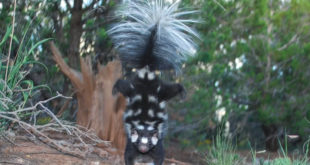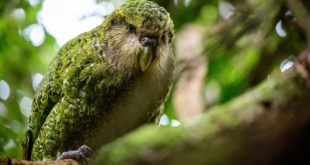An Arizona State University-led team of scientists has sequenced the genome of the Mojave desert tortoise (Gopherus agassizii), a long-lived species native to the Mojave Desert. The results could help the animal survive an increasing number of threats.
The Mojave desert tortoise (Gopherus agassizii). Image credit: Sandra Leander, Arizona State University.
The Mojave desert tortoise, one of six species of desert tortoises estimated to have arisen in North America about 35 million years ago, can be found in California, Nevada, Utah and Arizona.
Also known as the Agassiz’s desert tortoise, this species has been heavily impacted by habitat loss, a respiratory tract disease, and other anthropogenic factors. For instance, in one area of the species’ range density declined from about 225 individuals/km2 in 1979 to about 75 individuals/km2 in 1992.
The Mojave desert tortoise is listed as ‘threatened’ under the U.S. Endangered Species Act and is considered ‘vulnerable’ by the International Union for Conservation of Nature (IUCN).
To aid conservation efforts for preserving the genetic diversity of this species, Arizona State University Professor Kenro Kusumi and co-authors generated a whole genome reference sequence with an annotation based on deep transcriptome sequences of adult skeletal muscle, lung, brain, and blood.
“The Mojave desert tortoise genome is an important resource for the conservation of this species, particularly because this population is suffering from a serious disease,” said co-author Dr. Marc Tollis, also from Arizona State University.
“Researchers don’t yet fully understand its cause or what makes tortoises susceptible to it.”
“Decoding this genome will help us catalog which tortoise genes are evolving quickly enough to help them overcome this threat.”
The researchers obtained the genetic data for a particular tortoise specimen, assembled and annotated the genome and learned about the evolutionary history of tortoises.
“Decoding a genome has gotten technically a lot easier,” Prof. Kusumi said.
“What’s challenging now is decoding the information in the tortoise genome. We can use clues from similarities with the mouse and human genomes.”
“Finding the proverbial ‘needle in the haystack’ would be to identify the genes that direct the immune response to infectious disease, as well as the ability to survive the harsh conditions of the Mojave Desert.”
“It’s important for us to learn where tortoise diversity is located across its geographic range,” he added.
“Identifying hotspots of genetic diversity helps manage the species from a conservation standpoint and preserve tortoise populations that could respond better to unknown challenges in the years ahead.”
The team is also analyzing the genetic differences between the Mojave desert tortoise and its sister species, the Sonoran desert tortoise (Gopherus morafkai).
“My hope is that this study will enable other agencies to ask new questions, questions they would not have been able to ask without this research,” said co-author Dr. Greer Dolby, also from Arizona State University.
“For instance, ‘What immune genes do tortoises have to fight pathogens? How does their immune system function in an environment with lots of threats? And, how might a changing environment impact this?’ These are important questions to answer in managing the species. Now, we can begin investigating.”
The findings were published online May 31, 2017 in the journal PLoS ONE.
_____
M. Tollis et al. 2017. The Agassiz’s desert tortoise genome provides a resource for the conservation of a threatened species. PLoS ONE 12 (5): e0177708; doi: 10.1371/journal.pone.0177708
 #Bizwhiznetwork.com Innovation ΛI |Technology News
#Bizwhiznetwork.com Innovation ΛI |Technology News




